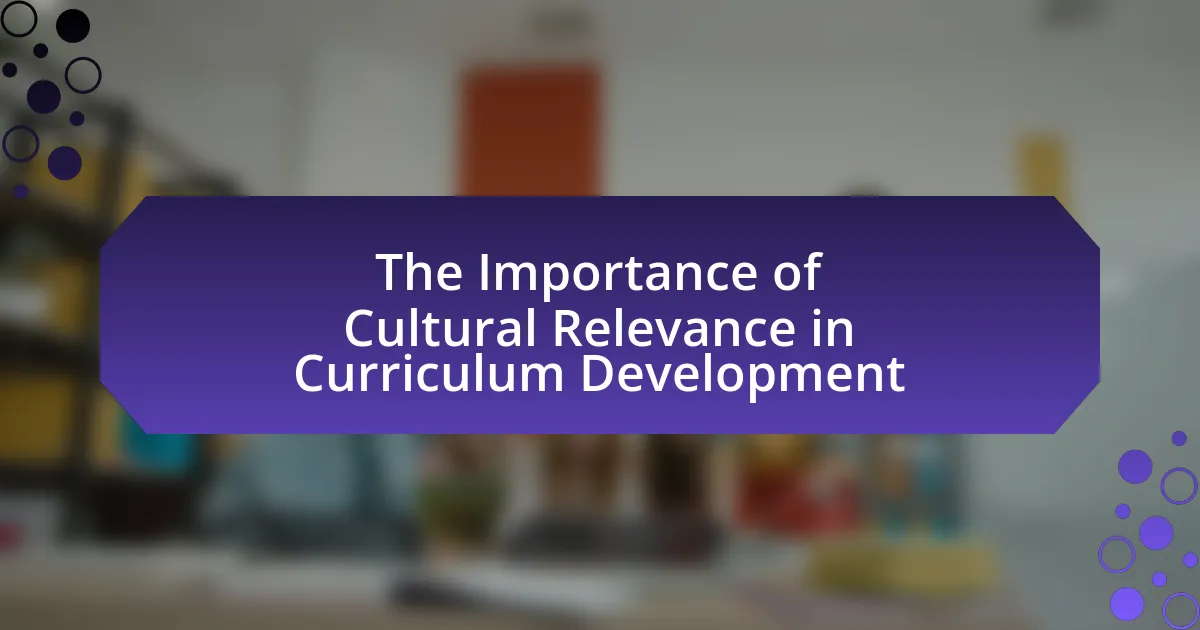Cultural relevance in curriculum development is essential for enhancing student engagement and improving learning outcomes by reflecting the diverse backgrounds and experiences of learners. This article explores the significance of incorporating culturally relevant materials and perspectives in education, highlighting how such practices can reduce achievement gaps and foster inclusivity. Key components of a culturally relevant curriculum include cultural competence, critical consciousness, and student-centered pedagogy, which collectively promote a deeper understanding of subject matter and validate students’ identities. Additionally, the article addresses challenges in implementing culturally relevant curricula and offers strategies for educators to effectively integrate cultural perspectives into their teaching practices.

What is the Importance of Cultural Relevance in Curriculum Development?
Cultural relevance in curriculum development is crucial as it enhances student engagement and learning outcomes by reflecting the diverse backgrounds and experiences of learners. When curricula incorporate culturally relevant materials and perspectives, students are more likely to connect with the content, leading to improved motivation and academic performance. Research indicates that culturally responsive teaching practices can significantly reduce achievement gaps; for instance, a study by Ladson-Billings (1994) found that students in culturally relevant classrooms demonstrated higher levels of critical thinking and academic success. Thus, integrating cultural relevance into curriculum development not only fosters inclusivity but also promotes a deeper understanding of the subject matter among students.
Why is cultural relevance crucial in education?
Cultural relevance is crucial in education because it enhances student engagement and learning outcomes by connecting the curriculum to students’ cultural backgrounds. When educational content reflects the diverse experiences and identities of students, it fosters a sense of belonging and validates their perspectives. Research indicates that culturally relevant pedagogy can improve academic performance; for instance, a study by Ladson-Billings (1994) found that students who experienced culturally relevant teaching were more likely to succeed academically and develop a positive self-identity. This connection between culture and education not only promotes inclusivity but also prepares students for a diverse society, making cultural relevance an essential component of effective curriculum development.
How does cultural relevance impact student engagement?
Cultural relevance significantly enhances student engagement by making learning more relatable and meaningful to students’ lives. When educational content reflects students’ cultural backgrounds, interests, and experiences, it fosters a sense of belonging and motivation to participate actively in the learning process. Research indicates that culturally relevant pedagogy can lead to improved academic performance and increased student participation. For instance, a study by Ladson-Billings (1994) demonstrated that students who engaged with culturally relevant materials showed higher levels of engagement and achievement compared to those who did not. This connection between cultural relevance and student engagement underscores the necessity of incorporating diverse perspectives in curriculum development to create an inclusive educational environment.
What role does cultural relevance play in promoting inclusivity?
Cultural relevance plays a crucial role in promoting inclusivity by ensuring that diverse cultural perspectives are represented and valued within educational settings. When curricula incorporate culturally relevant materials and perspectives, they foster a sense of belonging among students from various backgrounds, which enhances their engagement and participation. Research indicates that culturally relevant pedagogy can improve academic outcomes for marginalized groups by validating their experiences and identities, thus creating an inclusive learning environment. For instance, a study by Ladson-Billings (1994) highlights that students who see their cultures reflected in the curriculum are more likely to succeed academically and feel connected to their educational experience.
What are the key components of culturally relevant curriculum?
The key components of a culturally relevant curriculum include cultural competence, critical consciousness, and student-centered pedagogy. Cultural competence ensures that the curriculum reflects and respects the diverse cultural backgrounds of students, promoting inclusivity and engagement. Critical consciousness encourages students to analyze and challenge social injustices, fostering a sense of agency and empowerment. Student-centered pedagogy emphasizes active learning and collaboration, allowing students to connect their personal experiences to the curriculum. These components are essential for creating an educational environment that values diversity and promotes equity in learning outcomes.
How can educators identify cultural perspectives in curriculum design?
Educators can identify cultural perspectives in curriculum design by conducting thorough assessments of the cultural backgrounds and experiences of their students. This involves gathering data through surveys, interviews, and community engagement to understand the diverse cultural contexts that influence students’ learning. Research indicates that culturally responsive teaching improves student engagement and achievement, as highlighted in the work of Geneva Gay, who emphasizes the need for educators to integrate students’ cultural references into the curriculum. By actively involving families and communities in the curriculum development process, educators can ensure that the content reflects the values, beliefs, and practices of the students they serve, thereby fostering a more inclusive and relevant educational environment.
What strategies can be employed to integrate cultural relevance?
To integrate cultural relevance, educators can employ strategies such as incorporating diverse perspectives in curriculum content, utilizing culturally responsive teaching methods, and engaging with community stakeholders. Incorporating diverse perspectives ensures that students see their own cultures reflected in the material, which enhances engagement and understanding. Culturally responsive teaching methods, such as differentiated instruction and inclusive classroom practices, cater to the varied cultural backgrounds of students, promoting a more equitable learning environment. Engaging with community stakeholders, including parents and local cultural organizations, allows educators to gather insights and resources that enrich the curriculum, making it more relevant to the students’ cultural contexts. These strategies are supported by research indicating that culturally relevant pedagogy improves student achievement and fosters a sense of belonging in educational settings.
How does cultural relevance influence learning outcomes?
Cultural relevance significantly influences learning outcomes by enhancing student engagement and comprehension. When educational content reflects the cultural backgrounds and experiences of students, it fosters a sense of belonging and motivation to learn. Research indicates that culturally relevant pedagogy improves academic performance; for instance, a study by Ladson-Billings (1994) found that students who engaged with culturally relevant materials demonstrated higher levels of critical thinking and academic achievement. This alignment between curriculum and students’ cultural contexts not only aids in retention of information but also promotes a deeper understanding of the subject matter, ultimately leading to improved educational outcomes.
What evidence supports the effectiveness of culturally relevant pedagogy?
Culturally relevant pedagogy is supported by evidence indicating improved student engagement and academic performance among diverse student populations. Research by Ladson-Billings (1994) demonstrated that students who experienced culturally relevant teaching showed higher levels of academic achievement and motivation. Additionally, a study by Gay (2010) found that culturally responsive teaching practices fostered a sense of belonging and increased participation in classroom activities, leading to better educational outcomes. These findings underscore the effectiveness of culturally relevant pedagogy in enhancing learning experiences for students from various cultural backgrounds.
How does cultural relevance affect student identity and self-esteem?
Cultural relevance significantly enhances student identity and self-esteem by fostering a sense of belonging and validation within the educational environment. When students see their cultural backgrounds reflected in the curriculum, they are more likely to engage with the material, which boosts their confidence and self-worth. Research indicates that culturally relevant pedagogy can lead to improved academic outcomes and increased motivation among students, as it affirms their identities and experiences. For instance, a study by Ladson-Billings (1994) highlights that students who connect their cultural identities with their learning are more likely to excel academically and develop a positive self-image. This connection not only reinforces their identity but also cultivates a supportive learning atmosphere that values diversity and inclusion.
What challenges exist in implementing culturally relevant curriculum?
Implementing culturally relevant curriculum faces several challenges, including resistance from educators, lack of resources, and insufficient training. Educators may resist changes due to entrenched beliefs about traditional curricula, which can hinder the adoption of culturally relevant practices. Additionally, many schools lack the necessary resources, such as diverse teaching materials and community support, to effectively implement these curricula. Furthermore, teachers often receive inadequate training on how to integrate cultural relevance into their teaching, leading to a gap in effective implementation. These challenges collectively impede the successful integration of culturally relevant curriculum in educational settings.
How can educators overcome resistance to cultural relevance in curriculum?
Educators can overcome resistance to cultural relevance in curriculum by actively engaging stakeholders in the curriculum development process. This engagement includes soliciting input from students, parents, and community members to ensure diverse perspectives are represented. Research indicates that inclusive curriculum design leads to improved student engagement and academic performance, as seen in studies like “Culturally Relevant Pedagogy: Ingredients for Critical Teacher Reflection” by Gloria Ladson-Billings, which highlights the positive impact of culturally relevant teaching on student outcomes. By fostering open dialogue and demonstrating the benefits of cultural relevance, educators can effectively address and mitigate resistance.
What are common misconceptions about cultural relevance in education?
Common misconceptions about cultural relevance in education include the belief that it only pertains to minority cultures and that it is merely about including diverse materials in the curriculum. Many educators mistakenly think that cultural relevance is limited to surface-level representation, such as adding books by authors of different backgrounds, rather than integrating cultural perspectives into the core of teaching practices and learning experiences. Research indicates that effective culturally relevant pedagogy enhances student engagement and academic success across all demographics, demonstrating that cultural relevance benefits all students, not just those from specific backgrounds.
How can educators assess the cultural relevance of their curriculum?
Educators can assess the cultural relevance of their curriculum by conducting surveys and focus groups with students and community members to gather feedback on their experiences and perspectives. This method allows educators to identify gaps in representation and ensure that the curriculum reflects the diverse backgrounds of the student population. Research indicates that culturally relevant pedagogy enhances student engagement and academic success, as highlighted in the work of Gloria Ladson-Billings, who emphasizes the importance of incorporating students’ cultural references into the learning process. By actively seeking input from those directly affected by the curriculum, educators can make informed adjustments that promote inclusivity and relevance.
What tools and frameworks are available for evaluating cultural relevance?
Tools and frameworks available for evaluating cultural relevance include the Culturally Relevant Pedagogy framework, developed by Gloria Ladson-Billings, which emphasizes the importance of incorporating students’ cultural references in all aspects of learning. Additionally, the Multicultural Education framework provides guidelines for integrating diverse cultural perspectives into the curriculum. The Cultural Responsiveness Framework, created by the National Center for Culturally Responsive Educational Systems, offers strategies for assessing and improving educational practices to meet the needs of diverse learners. These frameworks are supported by research indicating that culturally relevant teaching improves student engagement and academic success, as evidenced by studies showing increased achievement among students from diverse backgrounds when culturally relevant practices are employed.
How can feedback from students inform curriculum adjustments?
Feedback from students can inform curriculum adjustments by providing insights into their learning experiences and cultural relevance. When students express their perspectives on course content, teaching methods, and engagement levels, educators can identify gaps or areas needing improvement. For instance, a study by the National Education Association found that incorporating student feedback led to a 20% increase in student engagement and satisfaction when curricula were aligned with their cultural backgrounds. This evidence demonstrates that actively seeking and integrating student feedback can lead to more culturally relevant and effective educational practices.
What best practices can enhance cultural relevance in curriculum development?
Incorporating diverse perspectives and local cultural contexts into curriculum development enhances cultural relevance. This practice ensures that educational content reflects the backgrounds and experiences of all students, fostering engagement and inclusivity. For instance, integrating literature, history, and examples from various cultures can help students relate to the material, as evidenced by studies showing that culturally relevant pedagogy improves student achievement and motivation. Additionally, involving community stakeholders in the curriculum design process allows for a more accurate representation of cultural values and practices, further solidifying the curriculum’s relevance to the students’ lives.
How can collaboration with communities improve curriculum relevance?
Collaboration with communities can significantly improve curriculum relevance by ensuring that educational content reflects the cultural, social, and economic contexts of the students. Engaging community members in curriculum development allows educators to incorporate local knowledge, values, and practices, making learning more applicable and meaningful. For instance, research conducted by the National Education Association highlights that when schools partner with local organizations, students demonstrate increased engagement and academic performance, as the curriculum resonates with their lived experiences. This alignment fosters a sense of belonging and relevance, ultimately enhancing educational outcomes.
What ongoing professional development is necessary for educators?
Ongoing professional development necessary for educators includes training in culturally relevant pedagogy, diversity and inclusion strategies, and continuous assessment of curriculum effectiveness. Educators must engage in workshops and courses that focus on understanding diverse cultural backgrounds and integrating these perspectives into their teaching practices. Research indicates that culturally relevant teaching improves student engagement and academic performance, as highlighted in the work of Ladson-Billings (1994) in “The Dreamkeepers: Successful Teachers of African American Children,” which emphasizes the importance of cultural competence in education. Additionally, educators should participate in collaborative learning communities to share best practices and reflect on their teaching methods, ensuring they remain responsive to the needs of all students.
What practical steps can educators take to ensure cultural relevance in their teaching?
Educators can ensure cultural relevance in their teaching by integrating diverse perspectives and materials that reflect the backgrounds of their students. This can be achieved by incorporating literature, historical examples, and case studies from various cultures into the curriculum, which fosters an inclusive learning environment. Research indicates that culturally relevant pedagogy enhances student engagement and academic success, as demonstrated by a study published in the “Journal of Educational Psychology” by Ladson-Billings, which found that students perform better when their cultural identities are acknowledged and valued in the classroom. Additionally, educators should engage with the community to understand the cultural contexts of their students, allowing for tailored teaching strategies that resonate with their experiences.



